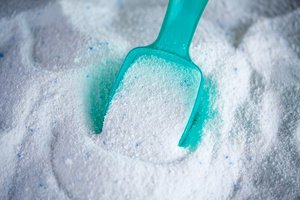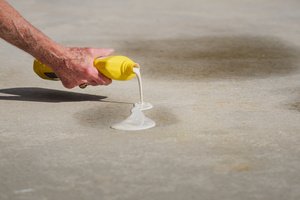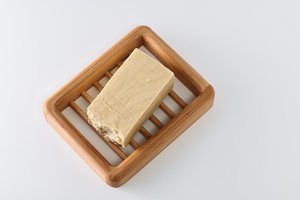The first thing people see when they approach your home is the exterior, which is why many homeowners strive to have a well-maintained lawn, aesthetically pleasing siding, and a clean driveway. Unfortunately, oil has a way of staining driveways without warning and removing oil stains from a driveway can be a difficult process.
These stains can be very stubborn, but the good news is that they are not nearly as daunting as they first appear. Most grease and oil spots can be removed fairly quickly with the right techniques and products. It doesn’t matter if the stain is new, old, big, or small – there’s a good chance you can find an effective technique to restore your driveway to its previous glory.
Here’s a look at our top seven techniques for removing oil stains from your driveway.
Use Laundry Detergent

If you thought that laundry detergent’s uses were limited to clothes, think again. Just as it breaks down the oil that spills on your clothing, laundry detergent can break down oil on your driveway.
First, sweep the affected area thoroughly to remove grime and dust and then drizzle some laundry detergent across the stain. Next, you’ll need to mix the detergent with some water to activate it. You can either pour water from a bucket or use a hose if the stain is larger.
Take a stiff brush and use it to work the detergent deeper into the stain, and then rinse the driveway off using clean water. It may be necessary to repeat the process a couple of times if all of the oil is not removed after the first try.
Absorb Fresh Oil With Kitty Litter
If there is fresh oil on your driveway, you may be wondering how you can remove it without pushing it deeper into the driveway and causing staining. One very effective approach is kitty litter. You can sprinkle a thick layer across stains that are still wet, then let it sit for an hour or two before scooping up the kitty litter using a shovel and sweeping the area.
Keep in mind that kitty litter can be made with a range of different materials, such as clay, crystals and wood shavings. The specific material does not matter as long as you use the absorbent types of kitty litter to clean up the oil. If you do not have a cat and would rather not purchase kitty litter, you might consider using other absorbent products you have around the house, such as baby powder or cornstarch.
Commercial Concrete Cleaner

While oven cleaner may work well on asphalt driveways, concrete driveways respond better to commercial concrete cleaners that are designed to safely clean this material. You can buy a dedicated concrete cleaner at a home improvement store.
Spread it across the stain and leave it to sit for at least 15 minutes. Then, take a nylon brush and scrub the stain thoroughly. Finally, spray the area using clean water. Should you find that the stain has not disappeared completely, repeat the process again.
Oven Cleaner
It may be labeled as being a product for ovens, but it makes sense that something that is designed to break down oil and grease in your oven could also have the same effect on your driveway. You will need to use the biodegradable varieties for this purpose to avoid the potential of washing caustic chemicals into your lawn or garden. This method is particularly suited to asphalt driveways.
Simply spray a layer of your biodegradable oven cleaner across the stain and let it sit for half an hour. Then, use a stiff brush to scrub the area thoroughly and rinse the stain using clean water.
Baking Soda
You can add oil stain removal to baking soda’s long and impressive list of functions around the house. Because it is mildly abrasive, it can clean up tough oil stains on your driveway with relative ease.
All you have to do is sprinkle a layer of baking soda across the stain and then work a little bit of water into it until you have created a paste-like texture. Then, using a nylon brush, work the baking soda into the stain itself. Finally, rinse the area using clean water.
Grease-Fighting Dish Soap

Grease-fighting dish soaps are designed to break down oil, and they can be effective on many types of driveways. After you have blotted up existing oil using paper towels or something absorbent like kitty litter, add several drops of dish soap to the oil stain. Then, spray water on the area and scrub the surface of the stain using a stiff brush. Finally, rinse the area with clean water, and the stain should be gone.
Some stains may be especially tough to remove. In this case, you might want to alternate between baking soda and dish soap. Baking soda’s abrasiveness and the degreasing abilities of soap can help to break down the stain better.
Fight Oil Stains With WD-40
A staple in most garages, WD-40 is a degreaser that can be very powerful when it comes to fighting oil stains on driveways. It also works well on concrete driveways that have rust stains.
After scrubbing it thoroughly, sprinkle kitty litter or another absorbent material across the stain to absorb the WD-40 as well as any remaining grease. Allow this to sit for around 15 minutes, and then use a shovel to remove it. Finally, sweep the area thoroughly.
Contact the Northern Virginia Driveway Specialists
Your driveway plays a key role in the overall appearance of your home and the impression it leaves on others. Keeping it in top shape can make all the difference in your own satisfaction with your home, as well as its resale prospects.
If you wish to update your driveway, reach out to the Northern Virginia driveway specialists at Dirt Connections to learn more about our services. From gravel and asphalt to pavers and concrete, we can help ensure your driveway is both beautiful and functional.
Summary

Dirt Connections was started with one goal in mind: providing quality residential and commercial construction services to clients on time and on budget. Reach out for more information on how we can support your next project.
For your convenience our estimates are free and by appointment. Call 703-940-9949 for a free estimate today!










































